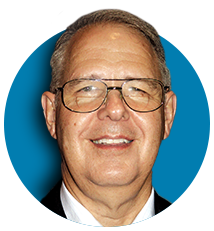ROANOKE, Va. — I was very fortunate when I stumbled into the laundry industry to work under two wonderful gentlemen—Henry Palmer and Bill Hendrix—who both had not only the knowledge of the industry, but also the vision to see its future.
I was fresh out of college and had a major in recreational land management from the Forestry Department at Utah State University. Unfortunately, I was finding it hard to find a job, so I wandered into the local hospital and hoped to find a job in the housekeeping department so I could support myself until I could find a job in my major.
The hospital employment office had a different idea and sent me to the central laundry facility, which at that time was attached to the hospital. I knew nothing about the commercial laundry business and was not prepared for what I saw. But they were happy to put me to work manually loading and unloading 600-pound Washex washer-extractors.
After the first day, I was ready to quit but the need to pay rent and eat kept me coming back. I soon found that I enjoyed the work and the diversity of the people I got to work with. I worked alongside many people from the island of Tonga and numerous South American countries. One of my fellow workers on the wash line was the son of immigrants from Finland.
After two weeks, I was promoted to washroom supervisor and then several months later I was promoted to an assistant shift manager. My college education opened the doors to my potential laundry career.
It was at this time that I got some great advice from these two gentlemen. Palmer explained the evolution of the industry to that point in 1972—how the commercial industry had changed with the advent of the home washing machines.
The home bundle laundry business had rapidly disappeared, which left the industry with more trained managers than jobs. This glut of managers was now rapidly reaching retirement age and there was a lack of young men in the field ready to take their place.
Hendrix took the time to explain the history of the laundry business as an essential service to hospitals, hospitality and restaurants—how the industry provided critical services to support these and other industries. He shared that it was, and would be for the foreseeable future, a good and secure industry in which to work.
Based on this information, and my love of working with people, I decided to make the healthcare laundry industry my chosen field of endeavor.
Today as I look at the industry, I would like to offer a little advice to the young men and women who are just starting out in the industry.
The laundry industry has a bright future in front of it. I have seen many changes over the years in textile products, laundry chemicals, processing equipment, and the support and technology used in the business.
To be an effective laundry professional in today’s industry requires an agile mind and one that is always looking to learn new things. Top management jobs now require a Bachelor of Science degree, but education without learning the hands-on skills associated with laundry production in my mind leaves a manager improperly prepared for the changes to come.
I was blessed with working my way up from the bottom, but if you did not get this opportunity, then provide it for yourself. Take off the shirt and tie and get directly involved in production in each area of your operation. What you will gain in knowledge and insight is well worth the time you will invest.
If, however, you entered the industry as a production worker and hope to become a manager one day, then make plans to take night classes and advance your education. As you gain knowledge, your ability to improve your laundry operation will also grow.
Secondly, embrace the history of your industry. The laundry industry has always been, and will always be, an entry-level position for recent immigrants. It is dependable work with skills that can be shown and taught without a solid grasp of the English language.
Reach out and cultivate opportunities to recruit the recent legal immigrant population. When I see a sign advertising English as a second language class, I see an opportunity to find new employees.
Work at becoming the preferred employment location for this type of employee. This can be done by treating the people with the respect and consideration any other employee deserves.
Make sure to use interpreters so they understand the company policies. We went the extra step and had onsite English classes offered after work for no charge. Be culturally sensitive and try to understand their culture and what is important to them.
Finally, always look to the future and try to understand the trends and challenges our industry faces and those of the industries you serve. Expect that you will always have to be adapting and learning new things.
Join a professional organization like ALM, TRSA or IFI and take advantage of their educational opportunities.
Cultivate good working relationships with your major vendors and challenge every vendor who knocks on your door to explain what is new at their company, why it is important, what challenge is it designed to meet and will it work in your operation. The more open you are the more you will learn and the better your operation will become.
I still believe as I did back in 1972 that the laundry industry is a great place to spend your working years. There is a team spirit, a sense of accomplishment that can be felt on a regular basis.
If you put in the effort to learn the industry from the ground up it will provide you with a lifetime of wonderful memories.
Have a question or comment? E-mail our editor Matt Poe at [email protected].

